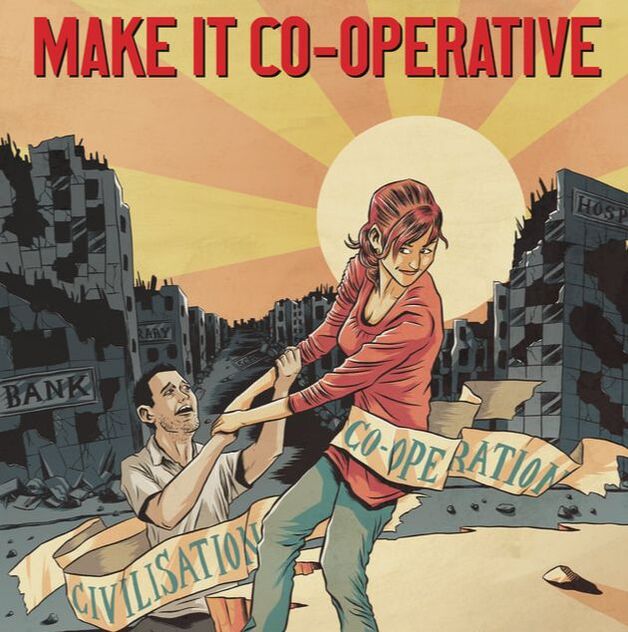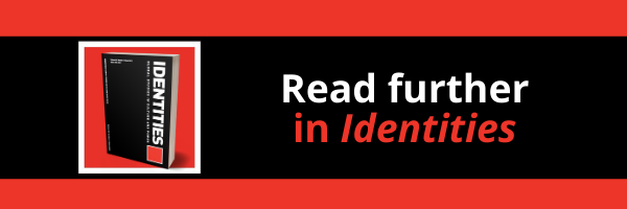|
|
|
The work of workers’ co-operatives and their worker-members hold great relevance in politically and economically rather dismal times. My Identities article, ‘Radical democratic citizenship at work in an adverse economic environment: the case of workers’ co-operatives in Scotland’, explores five workers’ co-operatives in view of how they collectively and democratically make decisions as well as give space, therein, to personal matters and circumstances of the worker-members.
A few words on the dreary economic and political backdrop. In the current context, we look back at a history of decades over which the political system we know as (representative) democracy has been hollowed out and populated with corporate interests ). Oligarchs hold political offices and wield power over policy makers through powerful lobbies and politicians move between political and top-salaried corporate offices. The massive lack of declared annual revenues by directorship-holding politicans may well be seen as testimony to the deficit in holding politicians accountable. Cronyism prospers amongst the economic and political elite as public money is secretively being handed out to the hands of corporations. In an interview, Oskar Lafontaine, once member of the Schröder cabinet in Germany, dispels the myth about Germany being a democracy but in fact an oligarchy. According to Devenney and Woodford, this holds true about the UK, too. At the same time, according to the British Social Attitudes Survey, the UK demonstrates a record high of distrust in the government – down to 15% in 2019.
Not only is the wealth gap widening, but so is the disconnect between the wealth-accumulating elected and the increasingly more precarious working class – particularly racial and ethnic minorities amongst them. Within these developments the elites are propagating a form of nationalism that feeds xenophobic sentiments and racism. Additionally, parallel to economic policies of free-trade and privatisation that benefit the elites by remove barriers for the circulation and accumulation of capital, the powerful few devise social policies to build barriers for immigrants which further nurture racism, turn immigrants into scapegoats, and create a hostile environment for racial and ethnic minorities. Meanwhile the capitalist market system that underpins these politics has vividely demonstrated not only its exploitative and dehumanising side but also that it is in fact lethal to nature and human beings around the globe (Bell, 2020; Monbiot, 2021). It couldn’t be clearer that we need fundmental, presumably also systemic, change. My conjecture is that a great potential lies in ‘alternative ways of being political and doing politics’ as for example the contributions of Emejulu and van der Scheer as well as Woodman and Zaunseder – part of Identities’ Radical Democratic Politics: From Theory to Practice Special Issue.
Even though workers’ co-operatives are not a blueprint for a non-capitalist economic system, we can find in them a distinct form of being political and doing politics. The presupposition is that the best area to look for democratic alternatives to navigate needed radical change is at the grassroots level. But they prefigure a viable way to organise work in a profoundly democratic way. They practice a constructive criticism of the capitalist organisation of work that may well be helpful for finding remedies and solutions to the deficits of the current economic and political system. Also integral to the operations of the five workers’ co-operatives is a highly ethical business agenda. Examples are support of racial and ethnic minority refugees and immigrants through collaborative projects addressing racism and xenophobia, as well as through financial and alimentary donations. Worker members run their co-operative in a direct-democratic way when it comes to making decisions. With collective and equal ownership, a flat hierarchy and an equal wage policy, they have established an egalitarian structure that lays the ground work for this form of democracy where power lies with the people consistently. Unlike in the corporate world, workers in these co-operatives do not experience the fruits of their labour exploited by the few towards the top of the organisation. Although one might consider them primarily an economic entity and thus be allocated as an alternative in the economic realm, my research shows that worker members of these workers’ co-operatives demonstrate that a bottom up democratic politics need not restricted to realm of formal politics. Moreover, in their practice of decision-making in that radical democracy they demonstrate that giving time and space to the personal is important for the recognition of the worker-members not only as labourers or voters but as whole human beings. Importantly, these above-mentioned democratic and egalitarian features are only truthful to such an ethical and democratic alternative if they are taken, firstly, together and, secondly, in this particular collective organisation, the workers’ co-operative. Some of these features are slyly appropriated by corporations in order to augment the extraction of labour value from as well as the exploitation of the employees whilst maintaining an appearance of business ethics and participatory democracy at work. Post-Taylorist business strategies, implemented particularly in the industry and service sector, ‘embrace the autonomy of the team and its authorization to make its own decisions as well as the levelling out of hierarchies’ to form and internalise an entrepreneurial subjectivity that comprehends ‘labor more and more as a “calling”’ whereby ‘workers’ motivations have to match whatever their job may require, they must be ready and willing to present every change of position at work as flowing from their own choice, and their involvement is to benefit the business as a whole’. These capitalist conceptions of management and organisation accommodate a new layer of alienation that inscribes into this new ‘individualism of self-realisation’ requirements such as ‘involvement, flexibility, and individual intiative’ – which creates ‘the space for legitimizing economic deregulation’ by activating a ‘greater readiness of individual employees to assume responsibility for themselves’. In these cases flat hierarchy, collective stake-holdership, responsibility – whether sharing or taking over, deliberative collective decision-making and team work are a few examples for cases where the corporations hijack co-operative features. Hence it comes as no surprise that in the business world workplace democracy increasingly gains attention to increase profits and productivity. In the end these measures are aimed at extracting more value from the workers in order for the few to skim off the additional profits. Finally, in thinking about how democratic change happens, it is fruitful to consider the worker-members running such workers’ co-operatives as a political endeavour in itself. Taking time for deliberation and democratic decision-making that is not productive in a merely capitalist economic sense, the worker members of these workers’ co-operatives practice this alternative against a backdrop of a fundamentally adverse economic system, a capitalist market system that only knows the imperative of profit, productivity, efficiency and incessant growth. These co-ops also pursue highly ethical business operations that go far beyond the green-washing realm of the corporate business ethics and corporate social responsibility. All in all, this activity inherent in their grassroots democratic practice and profoundly ethical pursuit becomes political because it not only means envisioning but also practicing a real alternative, as well as positing a constructive critique of the political and economic landscape of capitalism. This political activity embodied in co-operative work is of great importance, particularly in these times, not only deserves great respect, but also our support.
Image credit: Calverts Co-operative and Co-operatives UK. Reproduced with permission.
Blog post by Andreas Zaunseder, University of Aberdeen, UK
The author thanks Calverts Co-operative and Coops UK for their permission to use the poster created by artist Tom Humberstone. Deep gratitude goes also to the fabulous workers of the five workers’ co-operatives that enabled that research project. Read the Identities article: Zaunseder, Andreas. Radical democratic citizenship at work in an adverse economic environment: the case of workers’ co-operatives in Scotland. Identities: Global Studies in Culture and Power. DOI: 10.1080/1070289X.2021.1970979 OPEN ACCESS Read the Identities Special Issue: Radical Democratic Citizenship: From Practice to Theory
Explore other relevant Identities articles:
Introducing radical democratic citizenship: from practice to theory OPEN ACCESS Radical democratic citizenship at the edge of life: young children, cafés and intergenerational and intersectional activism OPEN ACCESS Exploring ‘festive commoning’ in radical gatherings in Scotland OPEN ACCESS
0 Comments
Your comment will be posted after it is approved.
Leave a Reply. |
|
Explore Identities at tandfonline.com/GIDE |
|
The views and opinions expressed on The Identities Blog are solely those of the original blog post authors, and not of the journal, Taylor & Francis Group or the University of Glasgow.


